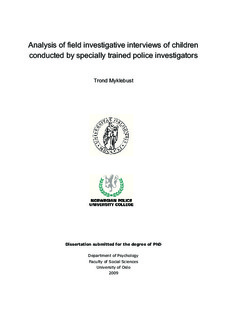| dc.description.abstract | In most child sexual abuse (CSA) cases field investigative interviews of children (FIIC) plays a crucial role in these investigations and are considered to be the evidence in chief, primarily because other evidence is typically unavailable. Whether or not an FIIC results in free narrative from the interviewed child says a great deal about the conversation, and in the cause of that it is the interviewer’s responsibility to make sure that the communication with the interviewed child goes well. The interviewer is the one who ultimately determines whether the FIIC is going to be an effective information gathering exercise. In the analysis of the most prominent variables in FIIC the conclusion of this PhD thesis could be summarised around three main findings.
Firstly, the interviewers’ use of open questions was demonstrated to be the quality measurement in FIIC, eliciting the longest answers compared to any of the other variables. The ratio of open and closed questions in study two and three was 1:10. Obviously police officers who conduct FIIC need to use more open questions in their interviews. And the only way to do that is for the interviewers to plan, practice, evaluate and continue to evaluate their interview practices.
Secondly, interviewing skills are not static. Even if the interviewers do have the knowledge and the research-based recommendations are endorsed, they are not implemented in the interviewers’ way of conducting FIIC in practice. The studies demonstrate that the interviewers, however skilful, get rusty and the interviewers with most practical competence are less effectively getting the shortest responses from the interviewed children. In the suggested improvement of the interviewers` FIIC, two models are presented. The first, at the individual interviewers’ level, suggests improvement in the training programmes by including supervision of the interviewers with the interviews conducted similar to the real FIIC, at the local police stations. The second suggested model is at the organisational level, by organising teams of investigators working together with dedicated peer consulting co-interviewers, monitoring and focusing on the interviewer`s performance coming up with alternative questions during the FIIC.
Thirdly, there is a verbal competence effect in court. The results indicate that the courts decisions are affected by the length of the children's responses in their testimonies. The children's responses to open questions was found to be 1.9 and 2.3 times longer in the convicted cases compared to acquittals or cases with insufficient evidence to proceed to court. This emphasises the importance of open questions in the interviews, and for both the interviewers and members of court to implement content analysis of the interviews and improve their evaluation procedures of FIIC.
Contrary to the popular myth, children do respond when they are questioned. The key point the author would like to emphasise is:
Whether or not children give a long response depends, not only on their limitation, but also on the interviewers` limitations and the interviewers` ability to, in a sense, take advantage of the children's strength and get them to function at the best of their abilities. Whereas, what he often saw in the analysis for this thesis were children functioning below their best effort. Interviewers, teaching institutions, academia and research environments, legislative authorities, and the court of law, are all responsible for improving the quality of procedures in connection with FIIC. The results show that there is a need for improvement | en |
